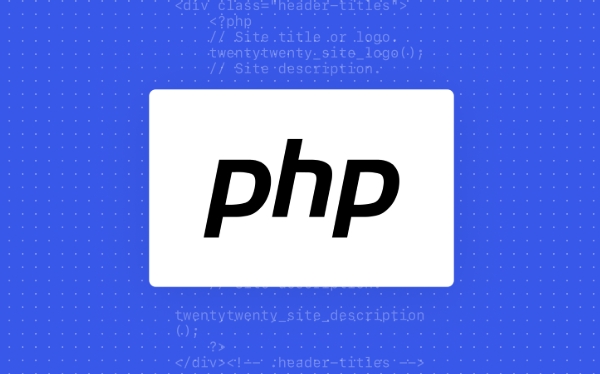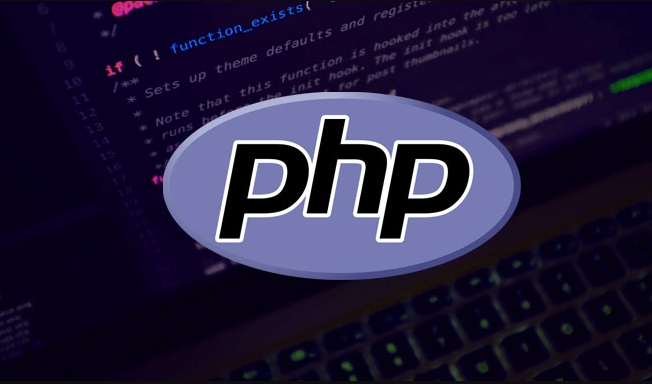The most common method to get the current date in PHP is to use the date() function, such as echo date("Ymd H:i:s") to output the full date; if only the date is required, it can be written as echo date("Ymd"); if you need a more friendly format, you can use echo date("l, F j, Y") to output the English date; for complex scenarios, you are recommended to use the DateTime class, such as $date = new DateTime() and get the formatting time through $date->format("Ymd H:i:s"); at the same time, you can ensure that the time in the correct region can be obtained by specifying time zones such as Asia/Shanghai; precautions include affecting the output by default time zones, recommending the unified use of the DateTime class, and caching time to improve efficiency.

To get the current date, it is actually very simple in PHP. The most common method is to use date() function. It can return the current date and time according to the format you specify.

Basic usage: Get the full date and time
echo date("Ymd H:i:s"); This outputs a format similar to 2025-04-05 14:30:45 . in:

-
Yrepresents a four-digit year -
mis a double-digit month -
dis a double-digit date -
His a 24-hour hour -
iis a minute -
sis seconds
You can adjust the format as needed, for example, as long as the date is:
echo date("Ymd"); // Output: 2025-04-05Get a more friendly date format
Sometimes you may want to display it more "human" like the English month or day of the week. You can also use date() at this time, but the format characters are slightly changed:

echo date("l, F j, Y"); // Output: Saturday, April 5, 2025-
l(lowercase L) means the full day of the week name -
Fis the full month name -
jis a date without leading zeros
This format is suitable for displaying more natural time information on web pages.
Use the DateTime class (recommended for complex scenarios)
If you are dealing with time zones, future dates, or doing date additions and subtraction operations, it is recommended to use the object-oriented DateTime class:
$date = new DateTime();
echo $date->format("Ymd H:i:s");This approach is more flexible, especially if you need to consider the time zone:
$date = new DateTime("now", new DateTimeZone("Asia/Shanghai"));
echo $date->format("Ymd H:i:s");This ensures that the current time in the specified region is obtained.
Notes and FAQs
- By default,
date()uses the time zone where the server is located. If you find that the output time is inconsistent with the local area, it is likely that this is the reason. - It is recommended to use
DateTimeclass uniformly in projects, especially when it involves internationalization or multi-time zones. - If you want the script to run more efficiently, you can also cache the current time and avoid multiple calls to the function.
Basically all this is the one, it is not complicated to implement, but it is easy to ignore the small details of the time zone and format.
The above is the detailed content of php get current date. For more information, please follow other related articles on the PHP Chinese website!

Hot AI Tools

Undress AI Tool
Undress images for free

Undresser.AI Undress
AI-powered app for creating realistic nude photos

AI Clothes Remover
Online AI tool for removing clothes from photos.

Clothoff.io
AI clothes remover

Video Face Swap
Swap faces in any video effortlessly with our completely free AI face swap tool!

Hot Article

Hot Tools

Notepad++7.3.1
Easy-to-use and free code editor

SublimeText3 Chinese version
Chinese version, very easy to use

Zend Studio 13.0.1
Powerful PHP integrated development environment

Dreamweaver CS6
Visual web development tools

SublimeText3 Mac version
God-level code editing software (SublimeText3)

Hot Topics
 How do I implement authentication and authorization in PHP?
Jun 20, 2025 am 01:03 AM
How do I implement authentication and authorization in PHP?
Jun 20, 2025 am 01:03 AM
TosecurelyhandleauthenticationandauthorizationinPHP,followthesesteps:1.Alwayshashpasswordswithpassword_hash()andverifyusingpassword_verify(),usepreparedstatementstopreventSQLinjection,andstoreuserdatain$_SESSIONafterlogin.2.Implementrole-basedaccessc
 How can you handle file uploads securely in PHP?
Jun 19, 2025 am 01:05 AM
How can you handle file uploads securely in PHP?
Jun 19, 2025 am 01:05 AM
To safely handle file uploads in PHP, the core is to verify file types, rename files, and restrict permissions. 1. Use finfo_file() to check the real MIME type, and only specific types such as image/jpeg are allowed; 2. Use uniqid() to generate random file names and store them in non-Web root directory; 3. Limit file size through php.ini and HTML forms, and set directory permissions to 0755; 4. Use ClamAV to scan malware to enhance security. These steps effectively prevent security vulnerabilities and ensure that the file upload process is safe and reliable.
 What are the differences between == (loose comparison) and === (strict comparison) in PHP?
Jun 19, 2025 am 01:07 AM
What are the differences between == (loose comparison) and === (strict comparison) in PHP?
Jun 19, 2025 am 01:07 AM
In PHP, the main difference between == and == is the strictness of type checking. ==Type conversion will be performed before comparison, for example, 5=="5" returns true, and ===Request that the value and type are the same before true will be returned, for example, 5==="5" returns false. In usage scenarios, === is more secure and should be used first, and == is only used when type conversion is required.
 How do I perform arithmetic operations in PHP ( , -, *, /, %)?
Jun 19, 2025 pm 05:13 PM
How do I perform arithmetic operations in PHP ( , -, *, /, %)?
Jun 19, 2025 pm 05:13 PM
The methods of using basic mathematical operations in PHP are as follows: 1. Addition signs support integers and floating-point numbers, and can also be used for variables. String numbers will be automatically converted but not recommended to dependencies; 2. Subtraction signs use - signs, variables are the same, and type conversion is also applicable; 3. Multiplication signs use * signs, which are suitable for numbers and similar strings; 4. Division uses / signs, which need to avoid dividing by zero, and note that the result may be floating-point numbers; 5. Taking the modulus signs can be used to judge odd and even numbers, and when processing negative numbers, the remainder signs are consistent with the dividend. The key to using these operators correctly is to ensure that the data types are clear and the boundary situation is handled well.
 How can you interact with NoSQL databases (e.g., MongoDB, Redis) from PHP?
Jun 19, 2025 am 01:07 AM
How can you interact with NoSQL databases (e.g., MongoDB, Redis) from PHP?
Jun 19, 2025 am 01:07 AM
Yes, PHP can interact with NoSQL databases like MongoDB and Redis through specific extensions or libraries. First, use the MongoDBPHP driver (installed through PECL or Composer) to create client instances and operate databases and collections, supporting insertion, query, aggregation and other operations; second, use the Predis library or phpredis extension to connect to Redis, perform key-value settings and acquisitions, and recommend phpredis for high-performance scenarios, while Predis is convenient for rapid deployment; both are suitable for production environments and are well-documented.
 How do I stay up-to-date with the latest PHP developments and best practices?
Jun 23, 2025 am 12:56 AM
How do I stay up-to-date with the latest PHP developments and best practices?
Jun 23, 2025 am 12:56 AM
TostaycurrentwithPHPdevelopmentsandbestpractices,followkeynewssourceslikePHP.netandPHPWeekly,engagewithcommunitiesonforumsandconferences,keeptoolingupdatedandgraduallyadoptnewfeatures,andreadorcontributetoopensourceprojects.First,followreliablesource
 What is PHP, and why is it used for web development?
Jun 23, 2025 am 12:55 AM
What is PHP, and why is it used for web development?
Jun 23, 2025 am 12:55 AM
PHPbecamepopularforwebdevelopmentduetoitseaseoflearning,seamlessintegrationwithHTML,widespreadhostingsupport,andalargeecosystemincludingframeworkslikeLaravelandCMSplatformslikeWordPress.Itexcelsinhandlingformsubmissions,managingusersessions,interacti
 How to set PHP time zone?
Jun 25, 2025 am 01:00 AM
How to set PHP time zone?
Jun 25, 2025 am 01:00 AM
TosettherighttimezoneinPHP,usedate_default_timezone_set()functionatthestartofyourscriptwithavalididentifiersuchas'America/New_York'.1.Usedate_default_timezone_set()beforeanydate/timefunctions.2.Alternatively,configurethephp.inifilebysettingdate.timez






